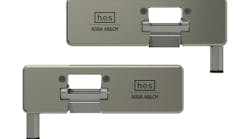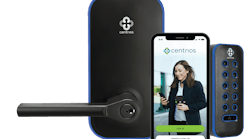Ledger technical editor Jerry Levine recently sat down with a lock shop supervisor for a major university. Topics of discussion included the duties of an institutional locksmith, hardware choices and future trends towards more electronic door hardware. Following are the Ledger’s questions and this institutional locksmith’s answers.
What is your locksmithing history and qualifications?
I have been involved in the locksmith industry for more than 25 years. I was an industrial locksmith for 10 years, in wholesale distribution for four years and a manufacturer’s representative for seven years. I received my AHC certification about five years ago. I have been the university’s lock shop supervisor for four years.
How many locksmiths including you work for the university?
We have 10 full time locksmiths and an assistant. The assistant is charged with the key records, closing work orders and key issuing process.
I have a great bunch of guys working for me. They pride themselves on the ability to make an opening secured by doing whatever is necessary to achieve the goal and maintain standardization at the same time. They have the ability to look past short-term solutions and keep the university’s best interests in mind as they work.
Our locksmiths cut thousands and thousands of keys each semester for the university. We no longer duplicate keys because of the risks involved in duplication vs. code cutting. Ninety-five percent of our keys are now code cut. We have many ITL code machines that at this time of year are kept humming.
What is your job description?
I run the lock shop, supervise the locksmiths and schedule their workdays. I specify the hardware on smaller projects and review hardware specifications for larger jobs. I work with outside hardware consultants, vendors and other university trades such as electricians and carpenters as relating to lock work.
This is a very old university and our goal is to standardize on one type of hardware per existing building. The different types of hardware are based on what was installed by the general contractor when the building was built. I recently participated in the creation of the university guideline hardware specifications for new construction and tenant improvements. I also specify the key system for each new building.
I am a locksmith and have worked in different phases in the industry, such as distribution and manufacturing. It gives me a unique perspective into the trade as a whole, and helps me to do a better job.
What hours do university locksmiths work?
We have two shifts that span from 7 a.m. to 9:30 p.m. Monday through Friday. In addition, we have a Saturday day shift.
Are locksmiths on 24-hour call? How are they scheduled?
Yes. There is a rotating schedule by the week for all off hours. We average a couple of emergency call-ins a week.
Are qualified locksmiths hard or easy to find?
It is hard to find qualified locksmiths. We have had large numbers of applicants. To find qualified locksmiths, we have an extensive hiring program including hands-on testing and peer review.
How do you maintain key records?
We are in the process of uploading all of the paper records into an electronic format.
How many buildings and doors do you and your locksmiths maintain? What is the area?
I know we have in excess of 35,000 rooms contained within more than 175 buildings occupying more than 10 million square feet. This number will rise as we are constantly improving our facilities with new buildings, new classrooms, labs, offices and student areas.
What brands of mechanical lock hardware you use?
Because we have been around for so many years with different departments in charge of construction and locksmithing, we have many different hardware brands. These include ASSA, Besam, Best, Command Access, Corbin Russwin, Glynn-Johnson, Horton, Hagar, Ives, LCN, Medeco, Norton, Omnilock, Rixson, Schlage, Simplex, Pemko, Precision, Trimco, Von Duprin, and Yale.
Do you have restricted or patented keyways?
Yes. We have Medeco old, middle and new (M3). We have Schlage Everest/Primus, ASSA, Corbin Russwin and Kaba. Our goal is to standardize on one type of hardware and keyway per existing building.
What brands of electromechanical lock hardware do you use?
Omnilock, Schlage AD and Kaba E-Plex.
Side Note: To maintain consistency and simplicity, the University decided to specify wire colors for every electronic lock component. Specific wire bundles are combined to make one larger access cable. For example, blue is always connected to the REX, no matter what building. The white bundle is the door contact. The orange bundle is for the card reader, and the gray bundle contains the wires for the lock. This ensures that there will not be wiring problems as each color is used for a specific function.
Are you transitioning from mechanical to electromechanical door locks?
Yes. We are transitioning in classrooms, laboratories, and exterior doors of all of the buildings. We install hardwired electromechanical door locks as well as standalone battery operated units.
Do you see every door in the university being equipped with electromechanical locks?
No. At this point in time, cost is a significant factor.
Where do you feel electromechanical security is most necessary?
Exterior doors and areas where there is a high turnover rate or high security/audit trail requirements.
What types of credentials do you use?
Dual credential cards that can be used not only for access, but to make purchases. We program the locks to use these university cards.
What agencies are you in contact with?
Fire department
Office of Statewide Health Planning and Development
Building permits
And additional State offices
Do you enjoy your job? Would you recommend it to others?
I truly love my job. I have a lot of fun here, and would not trade it for any other job! Well, maybe a lottery millionaire.





